Business Law Assignment (MMPA 503): Contract Law and Auctions
VerifiedAdded on 2023/02/01
|6
|1835
|99
Homework Assignment
AI Summary
This business law assignment analyzes two key legal issues. The first question examines the enforceability of a modified contract, focusing on the concept of consideration and the impact of economic duress. It analyzes a scenario where a party promises additional payment for the fulfillment of a pre-existing contractual duty, referencing relevant case law to determine whether the amended contract is legally binding. The second question addresses the legal implications of an auction sale, specifically whether an auctioneer is obligated to sell an item to the highest bidder, especially when the auction is subject to a reserve price. It also analyzes the formation of a contract through offer and acceptance, particularly when instantaneous communication methods are used, and how the timing of acceptance impacts contract formation. The assignment concludes with a legal analysis of both scenarios and provides a detailed account of the relevant case laws.
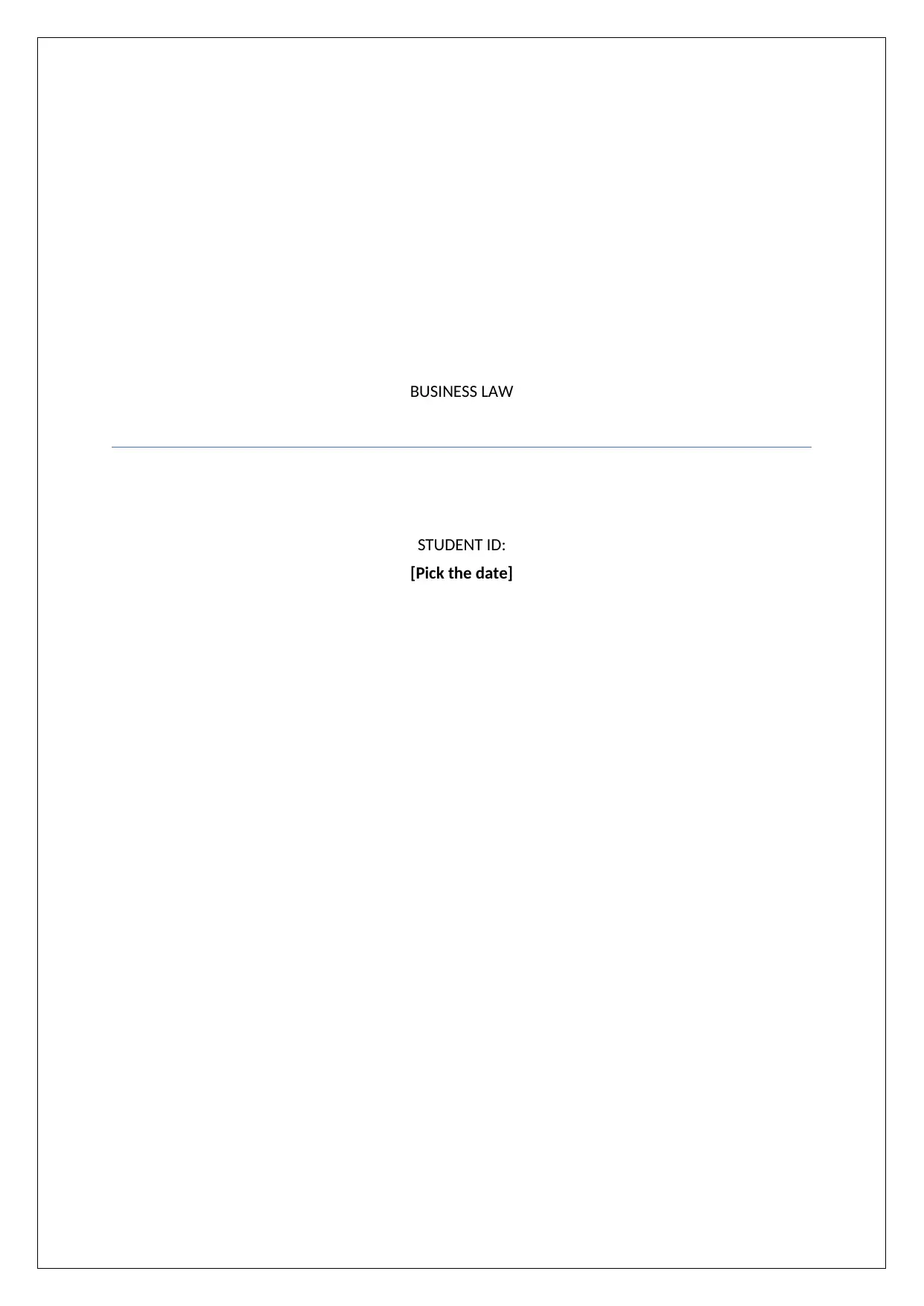
BUSINESS LAW
STUDENT ID:
[Pick the date]
STUDENT ID:
[Pick the date]
Paraphrase This Document
Need a fresh take? Get an instant paraphrase of this document with our AI Paraphraser
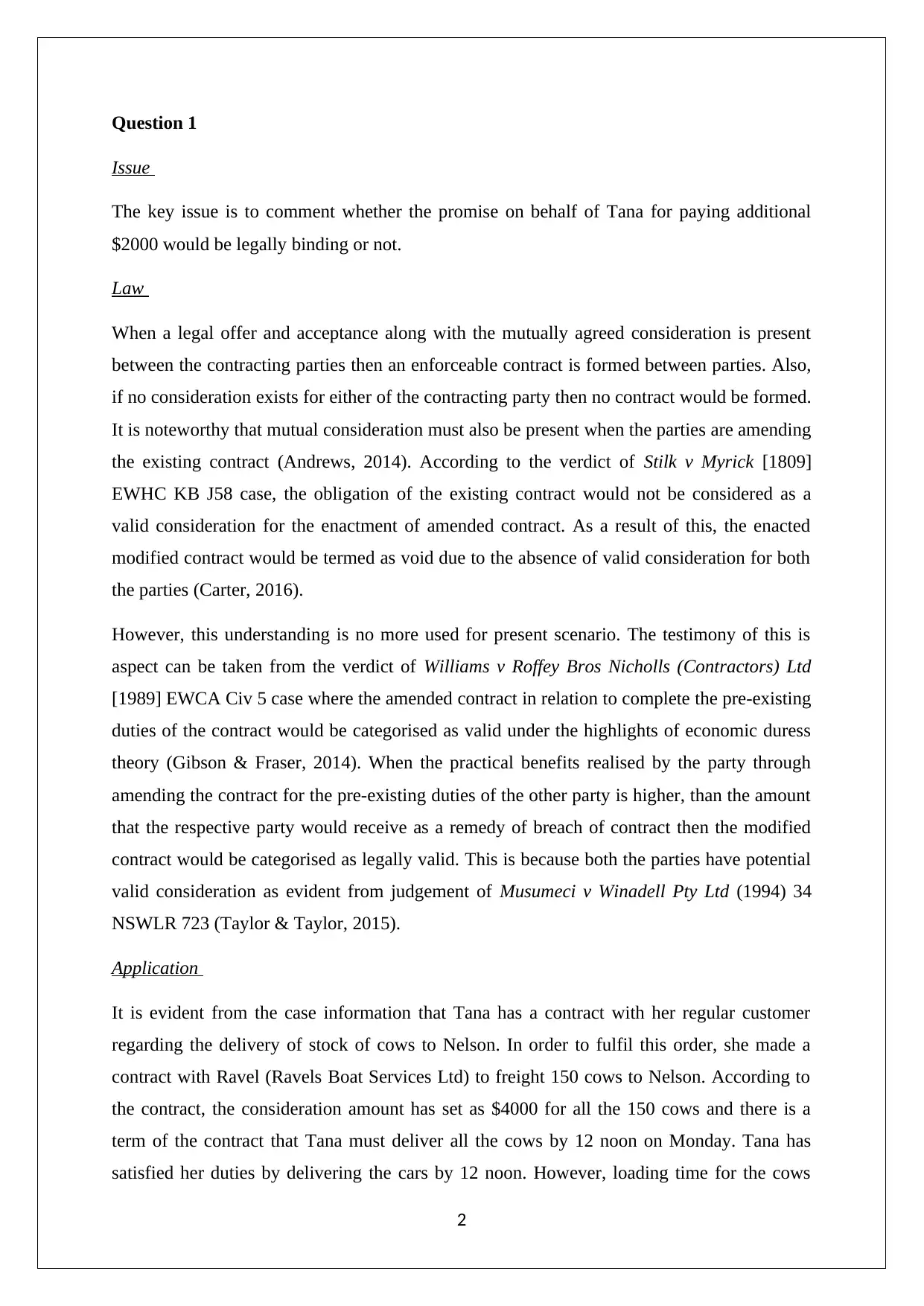
Question 1
Issue
The key issue is to comment whether the promise on behalf of Tana for paying additional
$2000 would be legally binding or not.
Law
When a legal offer and acceptance along with the mutually agreed consideration is present
between the contracting parties then an enforceable contract is formed between parties. Also,
if no consideration exists for either of the contracting party then no contract would be formed.
It is noteworthy that mutual consideration must also be present when the parties are amending
the existing contract (Andrews, 2014). According to the verdict of Stilk v Myrick [1809]
EWHC KB J58 case, the obligation of the existing contract would not be considered as a
valid consideration for the enactment of amended contract. As a result of this, the enacted
modified contract would be termed as void due to the absence of valid consideration for both
the parties (Carter, 2016).
However, this understanding is no more used for present scenario. The testimony of this is
aspect can be taken from the verdict of Williams v Roffey Bros Nicholls (Contractors) Ltd
[1989] EWCA Civ 5 case where the amended contract in relation to complete the pre-existing
duties of the contract would be categorised as valid under the highlights of economic duress
theory (Gibson & Fraser, 2014). When the practical benefits realised by the party through
amending the contract for the pre-existing duties of the other party is higher, than the amount
that the respective party would receive as a remedy of breach of contract then the modified
contract would be categorised as legally valid. This is because both the parties have potential
valid consideration as evident from judgement of Musumeci v Winadell Pty Ltd (1994) 34
NSWLR 723 (Taylor & Taylor, 2015).
Application
It is evident from the case information that Tana has a contract with her regular customer
regarding the delivery of stock of cows to Nelson. In order to fulfil this order, she made a
contract with Ravel (Ravels Boat Services Ltd) to freight 150 cows to Nelson. According to
the contract, the consideration amount has set as $4000 for all the 150 cows and there is a
term of the contract that Tana must deliver all the cows by 12 noon on Monday. Tana has
satisfied her duties by delivering the cars by 12 noon. However, loading time for the cows
2
Issue
The key issue is to comment whether the promise on behalf of Tana for paying additional
$2000 would be legally binding or not.
Law
When a legal offer and acceptance along with the mutually agreed consideration is present
between the contracting parties then an enforceable contract is formed between parties. Also,
if no consideration exists for either of the contracting party then no contract would be formed.
It is noteworthy that mutual consideration must also be present when the parties are amending
the existing contract (Andrews, 2014). According to the verdict of Stilk v Myrick [1809]
EWHC KB J58 case, the obligation of the existing contract would not be considered as a
valid consideration for the enactment of amended contract. As a result of this, the enacted
modified contract would be termed as void due to the absence of valid consideration for both
the parties (Carter, 2016).
However, this understanding is no more used for present scenario. The testimony of this is
aspect can be taken from the verdict of Williams v Roffey Bros Nicholls (Contractors) Ltd
[1989] EWCA Civ 5 case where the amended contract in relation to complete the pre-existing
duties of the contract would be categorised as valid under the highlights of economic duress
theory (Gibson & Fraser, 2014). When the practical benefits realised by the party through
amending the contract for the pre-existing duties of the other party is higher, than the amount
that the respective party would receive as a remedy of breach of contract then the modified
contract would be categorised as legally valid. This is because both the parties have potential
valid consideration as evident from judgement of Musumeci v Winadell Pty Ltd (1994) 34
NSWLR 723 (Taylor & Taylor, 2015).
Application
It is evident from the case information that Tana has a contract with her regular customer
regarding the delivery of stock of cows to Nelson. In order to fulfil this order, she made a
contract with Ravel (Ravels Boat Services Ltd) to freight 150 cows to Nelson. According to
the contract, the consideration amount has set as $4000 for all the 150 cows and there is a
term of the contract that Tana must deliver all the cows by 12 noon on Monday. Tana has
satisfied her duties by delivering the cars by 12 noon. However, loading time for the cows
2
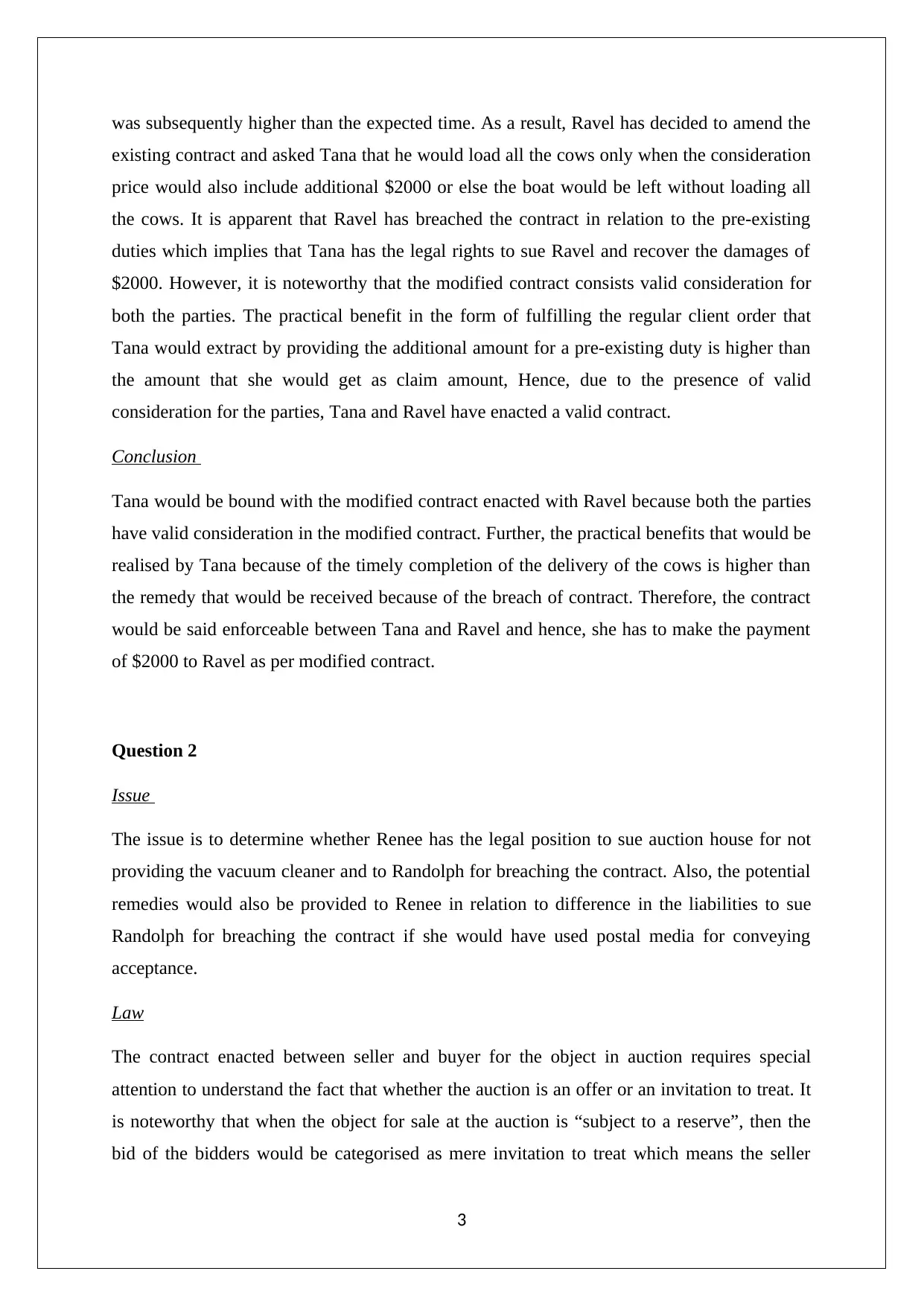
was subsequently higher than the expected time. As a result, Ravel has decided to amend the
existing contract and asked Tana that he would load all the cows only when the consideration
price would also include additional $2000 or else the boat would be left without loading all
the cows. It is apparent that Ravel has breached the contract in relation to the pre-existing
duties which implies that Tana has the legal rights to sue Ravel and recover the damages of
$2000. However, it is noteworthy that the modified contract consists valid consideration for
both the parties. The practical benefit in the form of fulfilling the regular client order that
Tana would extract by providing the additional amount for a pre-existing duty is higher than
the amount that she would get as claim amount, Hence, due to the presence of valid
consideration for the parties, Tana and Ravel have enacted a valid contract.
Conclusion
Tana would be bound with the modified contract enacted with Ravel because both the parties
have valid consideration in the modified contract. Further, the practical benefits that would be
realised by Tana because of the timely completion of the delivery of the cows is higher than
the remedy that would be received because of the breach of contract. Therefore, the contract
would be said enforceable between Tana and Ravel and hence, she has to make the payment
of $2000 to Ravel as per modified contract.
Question 2
Issue
The issue is to determine whether Renee has the legal position to sue auction house for not
providing the vacuum cleaner and to Randolph for breaching the contract. Also, the potential
remedies would also be provided to Renee in relation to difference in the liabilities to sue
Randolph for breaching the contract if she would have used postal media for conveying
acceptance.
Law
The contract enacted between seller and buyer for the object in auction requires special
attention to understand the fact that whether the auction is an offer or an invitation to treat. It
is noteworthy that when the object for sale at the auction is “subject to a reserve”, then the
bid of the bidders would be categorised as mere invitation to treat which means the seller
3
existing contract and asked Tana that he would load all the cows only when the consideration
price would also include additional $2000 or else the boat would be left without loading all
the cows. It is apparent that Ravel has breached the contract in relation to the pre-existing
duties which implies that Tana has the legal rights to sue Ravel and recover the damages of
$2000. However, it is noteworthy that the modified contract consists valid consideration for
both the parties. The practical benefit in the form of fulfilling the regular client order that
Tana would extract by providing the additional amount for a pre-existing duty is higher than
the amount that she would get as claim amount, Hence, due to the presence of valid
consideration for the parties, Tana and Ravel have enacted a valid contract.
Conclusion
Tana would be bound with the modified contract enacted with Ravel because both the parties
have valid consideration in the modified contract. Further, the practical benefits that would be
realised by Tana because of the timely completion of the delivery of the cows is higher than
the remedy that would be received because of the breach of contract. Therefore, the contract
would be said enforceable between Tana and Ravel and hence, she has to make the payment
of $2000 to Ravel as per modified contract.
Question 2
Issue
The issue is to determine whether Renee has the legal position to sue auction house for not
providing the vacuum cleaner and to Randolph for breaching the contract. Also, the potential
remedies would also be provided to Renee in relation to difference in the liabilities to sue
Randolph for breaching the contract if she would have used postal media for conveying
acceptance.
Law
The contract enacted between seller and buyer for the object in auction requires special
attention to understand the fact that whether the auction is an offer or an invitation to treat. It
is noteworthy that when the object for sale at the auction is “subject to a reserve”, then the
bid of the bidders would be categorised as mere invitation to treat which means the seller
3
⊘ This is a preview!⊘
Do you want full access?
Subscribe today to unlock all pages.

Trusted by 1+ million students worldwide
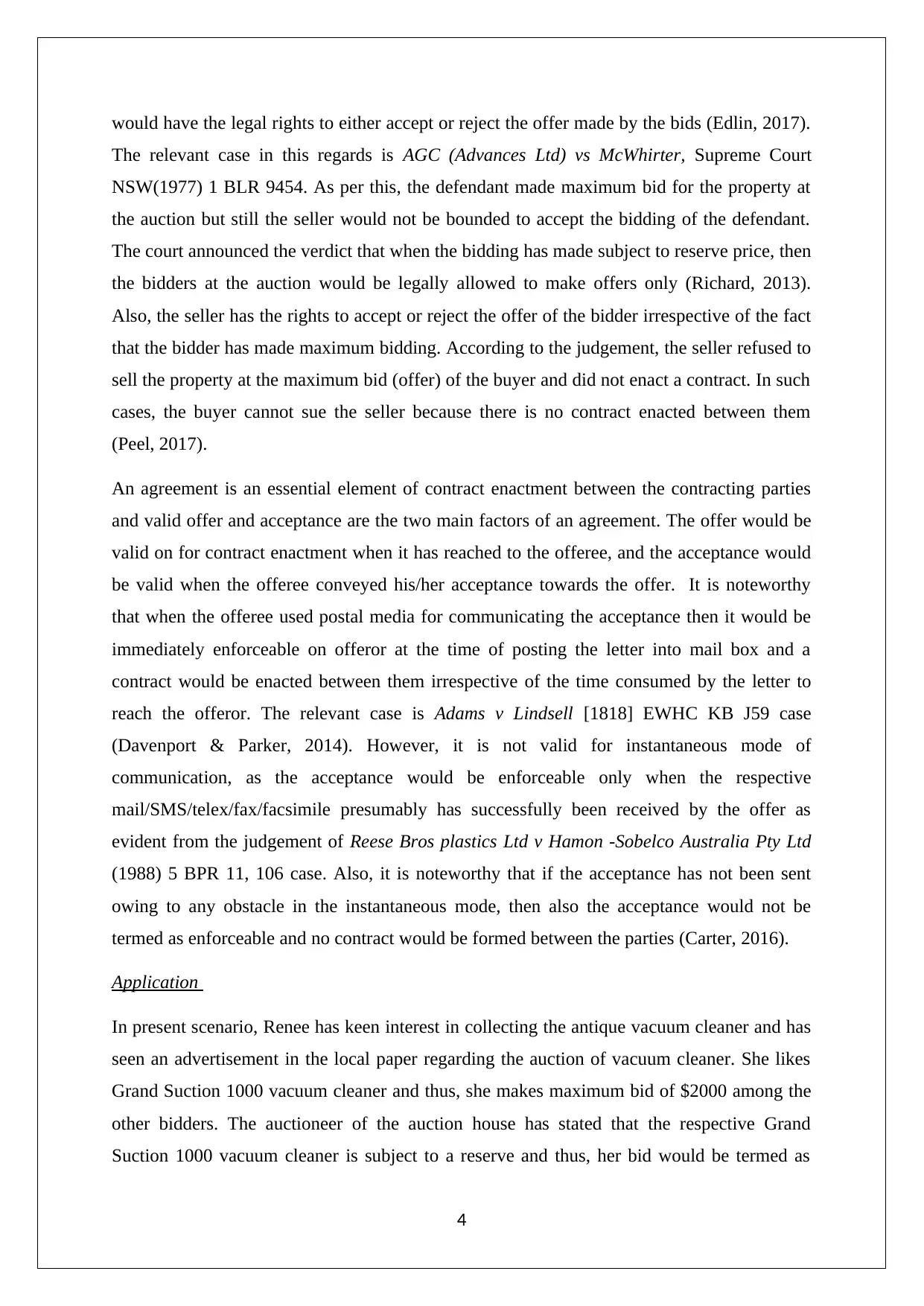
would have the legal rights to either accept or reject the offer made by the bids (Edlin, 2017).
The relevant case in this regards is AGC (Advances Ltd) vs McWhirter, Supreme Court
NSW(1977) 1 BLR 9454. As per this, the defendant made maximum bid for the property at
the auction but still the seller would not be bounded to accept the bidding of the defendant.
The court announced the verdict that when the bidding has made subject to reserve price, then
the bidders at the auction would be legally allowed to make offers only (Richard, 2013).
Also, the seller has the rights to accept or reject the offer of the bidder irrespective of the fact
that the bidder has made maximum bidding. According to the judgement, the seller refused to
sell the property at the maximum bid (offer) of the buyer and did not enact a contract. In such
cases, the buyer cannot sue the seller because there is no contract enacted between them
(Peel, 2017).
An agreement is an essential element of contract enactment between the contracting parties
and valid offer and acceptance are the two main factors of an agreement. The offer would be
valid on for contract enactment when it has reached to the offeree, and the acceptance would
be valid when the offeree conveyed his/her acceptance towards the offer. It is noteworthy
that when the offeree used postal media for communicating the acceptance then it would be
immediately enforceable on offeror at the time of posting the letter into mail box and a
contract would be enacted between them irrespective of the time consumed by the letter to
reach the offeror. The relevant case is Adams v Lindsell [1818] EWHC KB J59 case
(Davenport & Parker, 2014). However, it is not valid for instantaneous mode of
communication, as the acceptance would be enforceable only when the respective
mail/SMS/telex/fax/facsimile presumably has successfully been received by the offer as
evident from the judgement of Reese Bros plastics Ltd v Hamon -Sobelco Australia Pty Ltd
(1988) 5 BPR 11, 106 case. Also, it is noteworthy that if the acceptance has not been sent
owing to any obstacle in the instantaneous mode, then also the acceptance would not be
termed as enforceable and no contract would be formed between the parties (Carter, 2016).
Application
In present scenario, Renee has keen interest in collecting the antique vacuum cleaner and has
seen an advertisement in the local paper regarding the auction of vacuum cleaner. She likes
Grand Suction 1000 vacuum cleaner and thus, she makes maximum bid of $2000 among the
other bidders. The auctioneer of the auction house has stated that the respective Grand
Suction 1000 vacuum cleaner is subject to a reserve and thus, her bid would be termed as
4
The relevant case in this regards is AGC (Advances Ltd) vs McWhirter, Supreme Court
NSW(1977) 1 BLR 9454. As per this, the defendant made maximum bid for the property at
the auction but still the seller would not be bounded to accept the bidding of the defendant.
The court announced the verdict that when the bidding has made subject to reserve price, then
the bidders at the auction would be legally allowed to make offers only (Richard, 2013).
Also, the seller has the rights to accept or reject the offer of the bidder irrespective of the fact
that the bidder has made maximum bidding. According to the judgement, the seller refused to
sell the property at the maximum bid (offer) of the buyer and did not enact a contract. In such
cases, the buyer cannot sue the seller because there is no contract enacted between them
(Peel, 2017).
An agreement is an essential element of contract enactment between the contracting parties
and valid offer and acceptance are the two main factors of an agreement. The offer would be
valid on for contract enactment when it has reached to the offeree, and the acceptance would
be valid when the offeree conveyed his/her acceptance towards the offer. It is noteworthy
that when the offeree used postal media for communicating the acceptance then it would be
immediately enforceable on offeror at the time of posting the letter into mail box and a
contract would be enacted between them irrespective of the time consumed by the letter to
reach the offeror. The relevant case is Adams v Lindsell [1818] EWHC KB J59 case
(Davenport & Parker, 2014). However, it is not valid for instantaneous mode of
communication, as the acceptance would be enforceable only when the respective
mail/SMS/telex/fax/facsimile presumably has successfully been received by the offer as
evident from the judgement of Reese Bros plastics Ltd v Hamon -Sobelco Australia Pty Ltd
(1988) 5 BPR 11, 106 case. Also, it is noteworthy that if the acceptance has not been sent
owing to any obstacle in the instantaneous mode, then also the acceptance would not be
termed as enforceable and no contract would be formed between the parties (Carter, 2016).
Application
In present scenario, Renee has keen interest in collecting the antique vacuum cleaner and has
seen an advertisement in the local paper regarding the auction of vacuum cleaner. She likes
Grand Suction 1000 vacuum cleaner and thus, she makes maximum bid of $2000 among the
other bidders. The auctioneer of the auction house has stated that the respective Grand
Suction 1000 vacuum cleaner is subject to a reserve and thus, her bid would be termed as
4
Paraphrase This Document
Need a fresh take? Get an instant paraphrase of this document with our AI Paraphraser
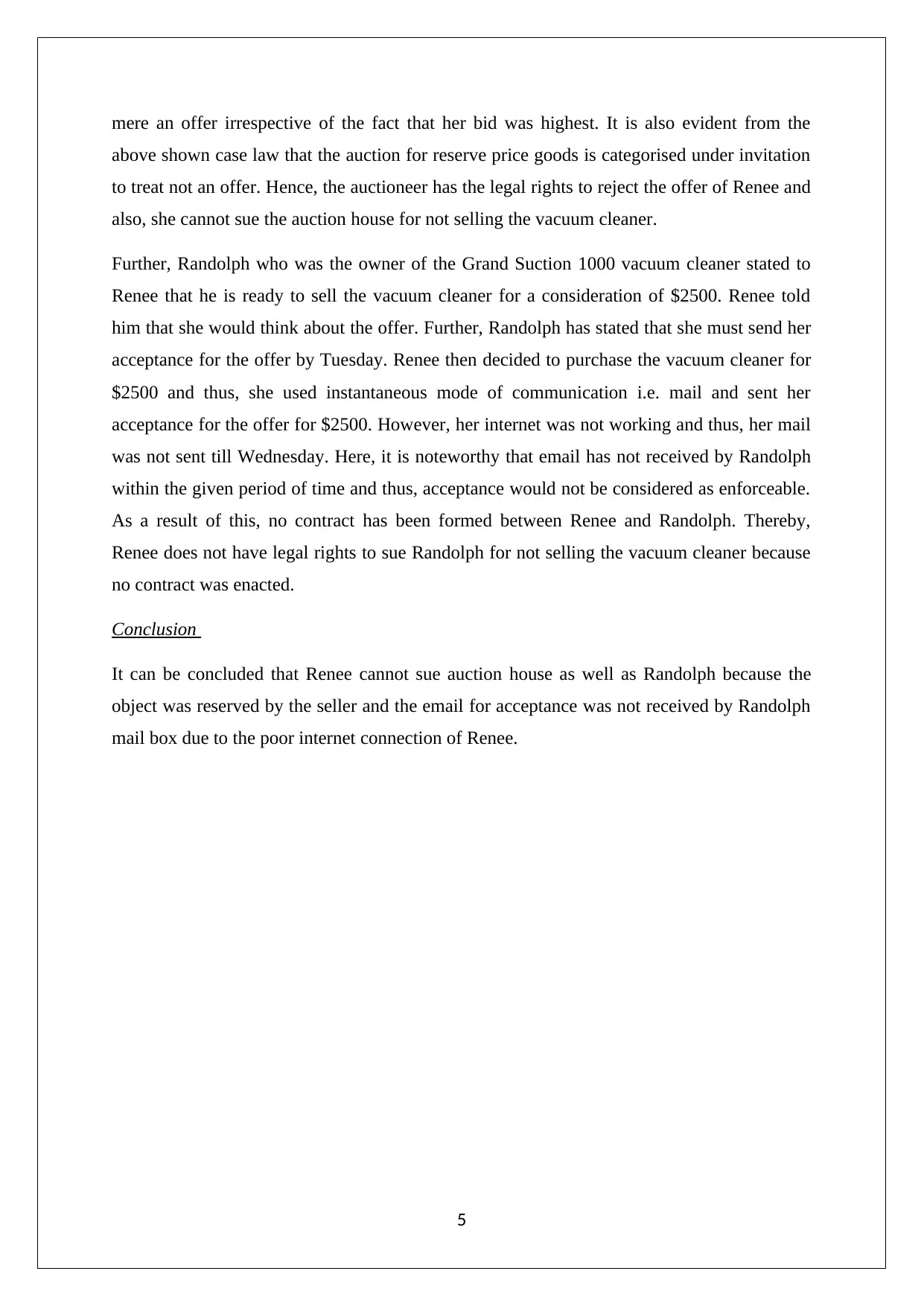
mere an offer irrespective of the fact that her bid was highest. It is also evident from the
above shown case law that the auction for reserve price goods is categorised under invitation
to treat not an offer. Hence, the auctioneer has the legal rights to reject the offer of Renee and
also, she cannot sue the auction house for not selling the vacuum cleaner.
Further, Randolph who was the owner of the Grand Suction 1000 vacuum cleaner stated to
Renee that he is ready to sell the vacuum cleaner for a consideration of $2500. Renee told
him that she would think about the offer. Further, Randolph has stated that she must send her
acceptance for the offer by Tuesday. Renee then decided to purchase the vacuum cleaner for
$2500 and thus, she used instantaneous mode of communication i.e. mail and sent her
acceptance for the offer for $2500. However, her internet was not working and thus, her mail
was not sent till Wednesday. Here, it is noteworthy that email has not received by Randolph
within the given period of time and thus, acceptance would not be considered as enforceable.
As a result of this, no contract has been formed between Renee and Randolph. Thereby,
Renee does not have legal rights to sue Randolph for not selling the vacuum cleaner because
no contract was enacted.
Conclusion
It can be concluded that Renee cannot sue auction house as well as Randolph because the
object was reserved by the seller and the email for acceptance was not received by Randolph
mail box due to the poor internet connection of Renee.
5
above shown case law that the auction for reserve price goods is categorised under invitation
to treat not an offer. Hence, the auctioneer has the legal rights to reject the offer of Renee and
also, she cannot sue the auction house for not selling the vacuum cleaner.
Further, Randolph who was the owner of the Grand Suction 1000 vacuum cleaner stated to
Renee that he is ready to sell the vacuum cleaner for a consideration of $2500. Renee told
him that she would think about the offer. Further, Randolph has stated that she must send her
acceptance for the offer by Tuesday. Renee then decided to purchase the vacuum cleaner for
$2500 and thus, she used instantaneous mode of communication i.e. mail and sent her
acceptance for the offer for $2500. However, her internet was not working and thus, her mail
was not sent till Wednesday. Here, it is noteworthy that email has not received by Randolph
within the given period of time and thus, acceptance would not be considered as enforceable.
As a result of this, no contract has been formed between Renee and Randolph. Thereby,
Renee does not have legal rights to sue Randolph for not selling the vacuum cleaner because
no contract was enacted.
Conclusion
It can be concluded that Renee cannot sue auction house as well as Randolph because the
object was reserved by the seller and the email for acceptance was not received by Randolph
mail box due to the poor internet connection of Renee.
5
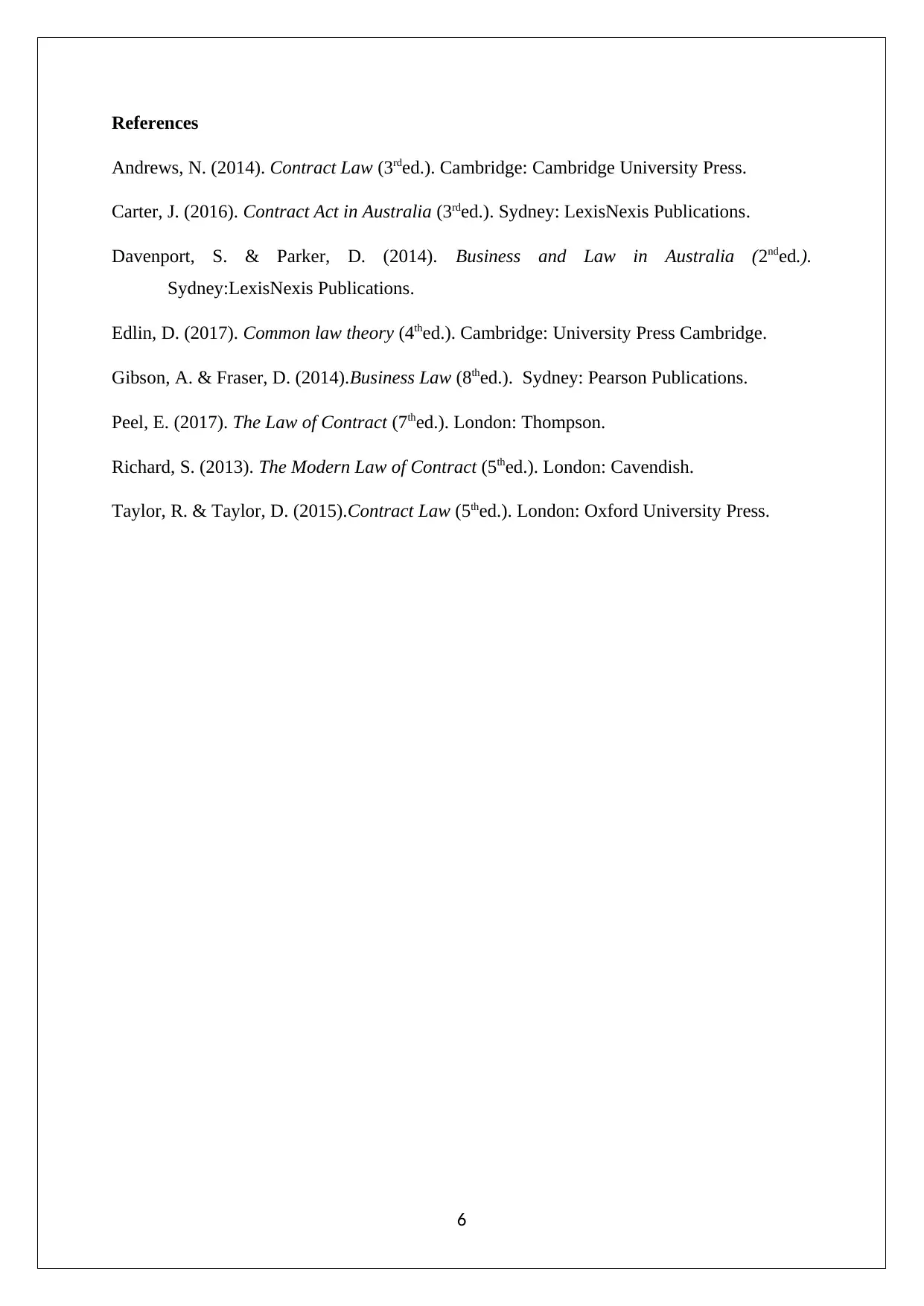
References
Andrews, N. (2014). Contract Law (3rded.). Cambridge: Cambridge University Press.
Carter, J. (2016). Contract Act in Australia (3rded.). Sydney: LexisNexis Publications.
Davenport, S. & Parker, D. (2014). Business and Law in Australia (2nded.).
Sydney:LexisNexis Publications.
Edlin, D. (2017). Common law theory (4thed.). Cambridge: University Press Cambridge.
Gibson, A. & Fraser, D. (2014).Business Law (8thed.). Sydney: Pearson Publications.
Peel, E. (2017). The Law of Contract (7thed.). London: Thompson.
Richard, S. (2013). The Modern Law of Contract (5thed.). London: Cavendish.
Taylor, R. & Taylor, D. (2015).Contract Law (5thed.). London: Oxford University Press.
6
Andrews, N. (2014). Contract Law (3rded.). Cambridge: Cambridge University Press.
Carter, J. (2016). Contract Act in Australia (3rded.). Sydney: LexisNexis Publications.
Davenport, S. & Parker, D. (2014). Business and Law in Australia (2nded.).
Sydney:LexisNexis Publications.
Edlin, D. (2017). Common law theory (4thed.). Cambridge: University Press Cambridge.
Gibson, A. & Fraser, D. (2014).Business Law (8thed.). Sydney: Pearson Publications.
Peel, E. (2017). The Law of Contract (7thed.). London: Thompson.
Richard, S. (2013). The Modern Law of Contract (5thed.). London: Cavendish.
Taylor, R. & Taylor, D. (2015).Contract Law (5thed.). London: Oxford University Press.
6
⊘ This is a preview!⊘
Do you want full access?
Subscribe today to unlock all pages.

Trusted by 1+ million students worldwide
1 out of 6
Related Documents
Your All-in-One AI-Powered Toolkit for Academic Success.
+13062052269
info@desklib.com
Available 24*7 on WhatsApp / Email
![[object Object]](/_next/static/media/star-bottom.7253800d.svg)
Unlock your academic potential
Copyright © 2020–2026 A2Z Services. All Rights Reserved. Developed and managed by ZUCOL.



